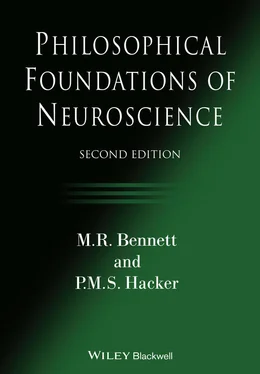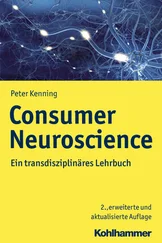With that fact alone, many other foundations in evolutionary biology turn out to be conceptual errors. I have detailed those errors elsewhere. 1They are fundamental to our view of ourselves as humans and our place in the universe, and raise many philosophical questions that had been considered closed, such as whether we and other organisms are purposeful.
Neuroscience, like any other field of science, cannot be immune from such problems raised by assumptions that creep into our views of the world and then become treated as accepted facts. The problems raised by metaphysical assumptions masquerading as empirical facts are just one example where collaboration between science and philosophy is necessary.
Finally, I wish to draw attention to the fact that this edition is not simply the original book updated. As the authors explain in their introduction, the book has been substantially rearranged to separate out conceptual problems that individually require more extensive treatment. Moreover, a vast literature, particularly on new technical methods, is out there to be taken into account.
I particularly appreciate the fact that there is now a separate chapter (3) concerned with the conceptual problems arising from ascribing to the brain properties that can only sensibly be ascribed to the organism as a whole. I see this point as a natural ally to my own arguments for multilevel interpretations of organisms (the principle of biological relativity), since those arguments lead to demonstrations that it does not make sense to ascribe functions, purposes and goals to levels of organization that could not possibly integrate those functions. As an example from my own field of physiology, it does not make sense to ascribe to the molecules of the heart the function of pumping blood around the body. Functions and purposes can only be ascribed to levels where they make sense (in this case to the complete circulatory system), and some of those (psychological attributes) are necessarily applied sensibly only to the whole living being. As the authors emphasize throughout their book, if a property cannot sensibly be ascribed to something, then it is not an empirical question whether it is or is not the case. Both answers would be meaningless.
Separating chapter 3from its related conceptual problems, such as introspection, enables those problems to be more thoroughly analysed in chapter 4. While reading that chapter I tried to imagine what it would be like for me to be in the privileged position of being an observer in some future neuroscience laboratory. My privilege would be to observe, through some yet-to-be-invented high-resolution process (vastly higher resolution than current scanning methods), the detailed molecular and electrical neural and other body processes that had been discovered to be those associated with me thinking about, for example, the square root of minus 1. And I realized of course that, were that to be possible, I would be just like those neuroscientists. I would have no idea how to interpret all the electrical and molecular events as somehow ‘being’ my idea of the square root of minus 1. I would be just as ignorant as I would be if gazing at the series of 0s and 1s in a computer readout of its binary-number activity when calculating a problem involving complex numbers.
That inability in understanding my own brain processes would have nothing to do with the problem I already had as a student when first grappling with and learning the concept of imaginary numbers (I use this example only because it readily shows just how absurd it would be to claim that one could ‘see’ imaginary numbers in my brain!). For I would also be none the wiser if the question I had been imagining while my brain was being examined was a much less problematic one, perhaps what I wished to eat for breakfast. The only way for those processes to be understood, by me or by the neuroscientists, would be for it to be me thinking those thoughts and telling the world what I was thinking. But the neuroscientists could learn that directly from me without recording from my brain.
I think this is a general problem in the multilevel understanding of organisms, not limited to the brain and nervous system. As I have already indicated in this foreword, all science requires conceptual analysis as an ongoing process.
1 1D. Noble, ‘The illusions of the modern synthesis’, Biosemiotics (2021), https://doi.org/10.1007/s12304-021-09405-3.
Denis Noble CBE FRS hon FRCP
31 May 2021
Foreword to the First Edition
Denis Noble CBE FRS hon FRCP
This book was simply waiting to be written. The reductionist agenda in biological science has generated so many conceptual difficulties that someone, sometime, had to analyse these problems in depth from outside the reductionist viewpoint. That a neurophysiologist and a philosopher should combine to do so is also a sign of the times. As biology moves on to address the complexity and extraordinary subtlety of life, now that it has broken it down into its smallest pieces, we will find this kind of combination of skills and ways of thinking even more necessary. As the authors make clear, philosophy (at least in the analytical form practised here) and empirical science are not in opposition. Rather they deal with different kinds of question. Yet, since a conceptual scheme is necessary to any fruitful experimentation, we cannot avoid asking both kinds. Keeping a clear head while we do so is not as easy as it may seem!
I must issue a warning: this book is highly controversial. Some of my scientific colleagues will strongly challenge, and will surely be deeply provoked by, the claim that neuroscience has frequently and systematically confused conceptual and empirical questions. To them I would say, first, that the authors clearly recognize the brilliance and phenomenal achievements of the scientists whose conceptual work they analyse. This is emphatically not a book debunking experimental science, any more than the fact that most physiologists now dismiss the dualist philosophy of Sherrington or Eccles detracts in any way from recognizing the immense significance of their scientific achievements. We find it perfectly possible to admire the experimental and associated analytical skills while wincing when we see how completely trapped they were in their outdated and indefensible philosophical position.
Second, I would appeal for some patience and humility. Patience, because as a physiologist who has interacted with (and published with) professional philosophers of various persuasions for over 40 years, 1I have to say that I find scientists unthinkingly debunking philosophy more often than the other way round. Humility, because the issues are of the utmost social importance. Some of the claims of reductionist science are not only conceptually incorrect or even unintelligible, they have major social implications. The words we use, the concepts by which we analyse and present biological discovery, deeply affect the way in which we see ourselves as human beings. For that reason, if for no other, a critical debate is necessary. The authors of this book have thrown down a major challenge in that debate.
The controversial nature of this book arises because the particular reductionist philosophical position it criticizes is very widely held today within the scientific community ( and also by some well-known philosophers). Moreover, for most of them, this position is a methodological necessity, perceived to be the only paradigm for science to successfully explain things. The first reaction to the counter-argument, as presented here, will be to protest that somehow science is being (unnecessarily? ) circumscribed; that some problems are, as it were, being taken from its grasp. I would argue the other way. The first step to scientific progress is to ask the right questions. If we are conceptually confused, we will ask the wrong questions. The authors illustrate this in detail with many examples.
Читать дальше












